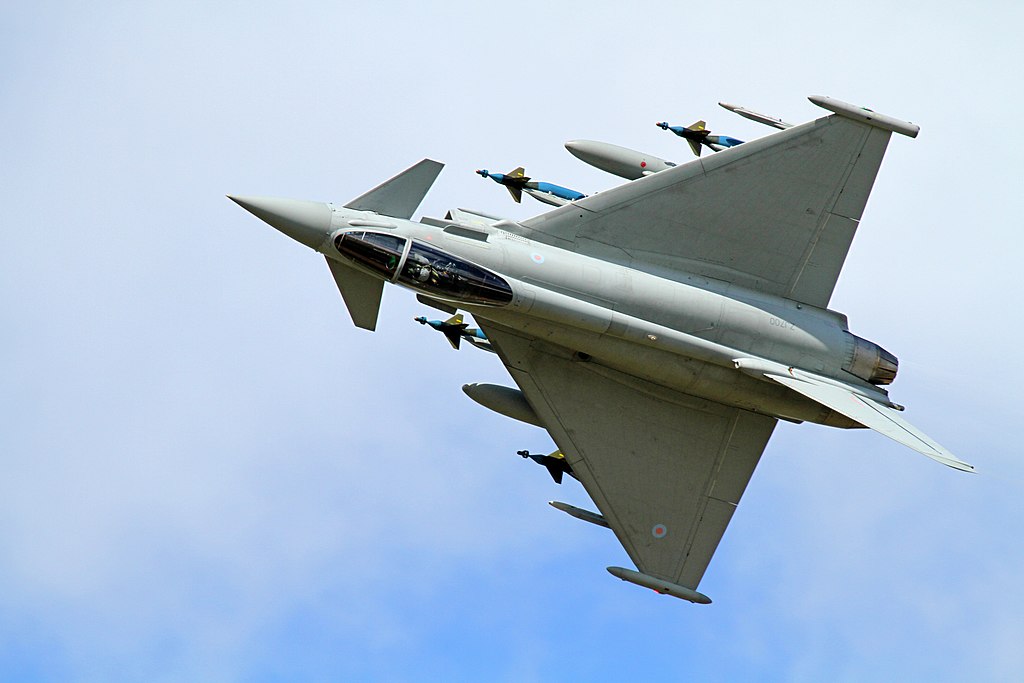“But the jobs!” – the go-to cry for many people in response to objections to the activities of the arms industry. The popular myth that the arms trade is a crucial source of jobs and prosperity is regularly trotted out to defend arms sales to dictatorships and countries at war, such as the continuous spigot of British arms sales to Saudi Arabia.
Some of these jobs are about to disappear, however. The UK’s top arms company, and the world’s third largest, BAE Systems, announced last Tuesday that they were laying off 2,000 workers in the UK, including 1,400 in military aerospace, at plants such as Warton in Lancashire and Brough in East Yorkshire—small northern manufacturing towns heavily dependent on BAE as a local employer. This follows a previous round of job losses in 2015. BAE specifically blamed poor sales of the Eurofighter Typhoon—an advanced combat aircraft jointly produced in the UK , Germany, Italy and Spain, by a consortium of BAE, Italy’s Leonardo-Finmeccanica, and pan-European Airbus. The last of 72 Typhoons sold by the UK to Saudi Arabia, and currently seeing active combat in Saudi Arabia’s brutal campaign in Yemen, was delivered in 2017.
Not that BAE Systems are doing badly as a whole. They made profits of £938 million in 2016 on global sales of £19 billion. But major combat aircraft such as the Eurofighter are highly capital intensive to produce, and operate in an overcrowded global market, where buyers hold most of the market power.
Over the period 2006-2015, a total of 1,190 major combat aircraft were delivered worldwide as part of international arms deals.[1] However, 950 of these, or 80%, were sold by either the US and Russia. These two countries tend to split the global market between them based on geopolitics and economy, with the US offering probably the most advanced aircraft, usually to their many allies, while Russia sells to countries like China that the US won’t sell to, historical allies such as India, and those that want something a bit more affordable.
This leaves the other major producers, including the UK, France, Germany, Italy, Sweden, China (another seller at the bargain basement end of the market), and most recently South Korea, scrabbling around for the remaining 20%. Within Western Europe, there are three competing planes: the Eurofighter, the French Rafale, and the Swedish Gripen, all of which have to go up against US and/or Russian competitors in every tender. And for most countries (excepting the likes of Saudi Arabia, who seem always willing to blow their vast oil wealth on an ever-growing arsenal), major combat aircraft purchases tend to be a once-in-a-generation affair.
The Eurofighter, specifically, has made just four definite sales to external countries (outside the four cooperating nations): the UK has sold 72 planes to Saudi Arabia and 12 to Oman, Germany has sold 15 to Austria, and Italy has sold 28 to Kuwait. A UK sale of 24 to Qatar has been provisionally agreed, but no contract has so far been signed.
Given the strong buyer’s market, companies must offer additional perks beyond the planes themselves to be selected over their many rivals. One of these is offsets, whereby the manufacturers agree to make other, often unrelated, investments in the buyer country, source components from them, transfer technology, and or make countertrade purchases. Offsets, banned by the World Trade Organization treaty on government procurement for all other sectors, are almost ubiquitous in major arms deals, but are of dubious economic value, increase the price of the deal, and, due to their highly murky nature, frequently open the door to corruption.
More direct corruption is also a common feature of such deals, including between rich, western countries generally thought of as transparent. German sale of Eurofighters to Austria, for example, is the subject of a major corruption investigation that has now touched Airbus CEO Thomas Enders. Germany and Austria typically rate among the less corrupt nations in Transparency International’s Corruption Perceptions Index (Germany were 10th and Austria 17th in 2016). The UK arms trading relationship with Saudi Arabia, of course, has a long and egregious history of corruption, with the UK government cancelling a Serious Fraud Office investigation into the deals to protect it. When it comes to this unique, highly politicized business where governments are desperate to make sales to sustain their domestic industrial capabilities, whatever expectations of transparency and integrity might apply in other sectors go out the window.
How does this relate to jobs? Exports of major weapons systems certainly sustain some jobs, and they tend to be high-skilled, high-paying ones—good jobs. But these jobs are inherently unstable, as the BAE announcement shows, being dependent on a desperate scramble in a crowded market for occasional big deals, which frequently can only be sealed with the aid of bribes. This is not a sustainable model for long-term employment. Moreover, again contrary to popular mythology, there are not that many of them, in part due to the high capital intensiveness of the industry. In fact, US research shows that public investment in almost any other sector, including health, education, infrastructure and green energy, produces considerably more jobs per billion dollars than in the military sector.
The question for countries such as the UK, France, Germany, Italy, Sweden and the like is, is this really a good way of securing jobs and maintaining a strong manufacturing base? Some of these countries, like Germany and Sweden, at least have strong industrial policies generally and have kept hold of significant civil manufacturing industries. Britain, on the other hand, has put most of its manufacturing eggs in the arms basket. Indeed, the current government is doubling down on the arms industry as its great shining export hope—half of the current secondments from private industry to the UK Department of Trade come from the arms industry, despite the fact that arms exports account for less than 1.5% of total UK exports. Rather than continuing to fuel wars and compromise their international reputation for anti-corruption in such an uncertain and overcrowded international market, the UK and others could be investing more in renewable energy and green technologies, markets that can only grow and on which the future of the planet depends, in the long-term creating more jobs with far more stability and social value.
Notes:
[1] All information on arms orders and deliveries from SIPRI Arms Transfers Database, http://www.sipri.org/databases/armstransfers



